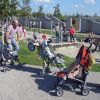Body and soul
Wellness and health are key reasons why many visitors come to Germany.

Wellness, health and “med in Germany”
Neuschwanstein Castle, the North Sea and the Alps, Museum Island in Berlin, German beer – there are plenty of good reasons to visit Germany. Although the number of foreign tourists surged by a healthy 8% in 2012, this is partly thanks to the draw exerted by factors that are not (as yet) to be found in every travel guide – namely “prevention, regeneration, medicine”, not to mention “wellness”. On the one hand, their increasingly strong magnetic effect on foreign visitors is due to growing health awareness; on the other hand, recuperation and health have a long tradition in Germany. Like in Baden-Baden, for example, where even the ancient Romans enjoyed the thermal springs and the Russian nobility later came for spa treatments in a sophisticated atmosphere. Or the Baltic resort of Heiligendamm, known as the “cradle of spa architecture”. This is where Germany’s first coastal resort was established in 1793, which immediately advanced to become a meeting place for the European aristocracy.
Virtually all of the more than 350 spas and therapeutic baths in Germany boast a similarly illustrious past, and naturally all fulfil the legal requirements for official recognition as a beneficial site: pure and fresh air at the very least, plus any of the following: mud, clay and fango; chalk; therapeutic gases such as radon; thermal, brine, mineral and sea water; and of course personnel with first-class medical training. Only then can a place legitimately term itself a spa or therapeutic bath. The American medical journalist Lynn Payer believes that it is a legacy of the Romantic period that medicine attaches such importance to the healing powers of nature. She has studied the cultural differences between the health systems of various countries and found none in which recovery and recuperation play such a prominent role as in Germany. This is a unique selling proposition that inspires huge confidence in these core competencies in Germany, a range of services that these days also includes countless wellness offerings: yoga at the Baltic Sea, hiking in the Allgäu region, de-stressing in the Westerwald – all complemented by the culinary expertise of chefs trained in the art of “health-conscious gourmet cuisine”. Naturally, wellness is always part and parcel of any spa package, and both are key elements in a chain of services that have become hugely more important: medical tourism.
Every year, around 77,000 patients from 171 countries come to Germany for inpatient treatment. In addition, there are some 115,000 international patients who come for outpatient treatment, and the numbers are rising rapidly. After all, the German healthcare system is ranked the fourth-best worldwide, which makes “med in Germany” extremely popular. Germany is synonymous with “top-quality medical care, technical progress and innovation”, says Jens Juszczak. An economist at the Bonn-Rhein-Sieg University of Applied Sciences, where the topic of medical tourism has been studied for years, he knows what it is that international patients appreciate above all: “The excellent care provided by renowned specialists, complemented by outstanding services in the area of prevention and rehabilitation.” The German National Tourist Board’s “Medical Travel” brochure shows exactly what this means: cutting-edge specialization and optimal care. Like at the German Heart Centre Munich, where the disciplines of cardiology and cardiovascular surgery are organized in an interdisciplinary way to enable “virtually any constellation to be dealt with, no matter how complicated”. Or the Medical Department and Clinic III at the Carl Gustav Carus University Hospital in Dresden, which is one of the leading diabetes centres in Germany and home to Europe’s first chair for diabetes prevention. Other highlights include the Department of Haematology, Oncology and Rheumatology at Heidelberg University Hospital, which is run by one of the world’s finest experts in this field: Professor Anthony D. Ho, who set up and managed blood stem cell transplant centres in Canada and the USA. The Charité in Berlin has “built up internationally renowned expertise” in fields which include neuro-oncology, vascular neurosurgery and spinal neurosurgery. These are just a few examples of the impressive medical portfolio upon which Germany’s excellent reputation is founded. Incidentally, the disciplines most in demand are orthopaedics, internal medicine, general and abdominal surgery, trauma and orthopaedic surgery, cardiology and oncology.
What is more, the hospitals have long since adapted to the special needs and requirements of foreign patients, offering information systems in various languages, prayer rooms, interpreters, accommodation for other family members, special meal plans that reflect the specific dietary requirements of people from other cultures, television channels in different languages and staff who are native speakers of the patients’ own languages. In addition, all-inclusive medical tourism packages are tailored to the patients’ needs. Visitors who come to Germany for an operation, a consultation or even just a check-up can combine their visit with shopping, sightseeing, rehabilitation or wellness – depending on their interests and how much time they have – and are made to feel very welcome. In Baden-Baden, for instance, which is particularly popular among visitors from the CIS countries, there is hardly a single spa left which does not employ Russian-speaking staff.
German hospitals are not only extremely popular among patients from CIS countries, even if their number has risen nearly fivefold in just seven years. Among non-EU patients from abroad, they share the top spot with visitors from the USA and from Arab states. The absolute majority of medical tourists come from the Netherlands, France, Austria, Poland and Belgium. As a souvenir of their time in Germany, all medical tourists will hopefully be relaxed, fully recuperated and in good health when they return home.

